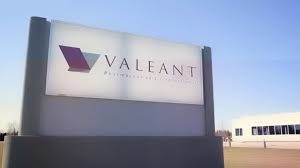The Demise of Valeant Pharmaceuticals: A Case Study in Rotten Culture and Business Ethics
 Showing my age again, Woody Allen’s Take the Money and Run included a hilarious scene when Woody’s parents wearing Groucho Marx glasses talk about their criminal son (Woody/Virgil Starkwell), his dad exclaimed “He’s rotten, he is a gangster.” See clip here.
Showing my age again, Woody Allen’s Take the Money and Run included a hilarious scene when Woody’s parents wearing Groucho Marx glasses talk about their criminal son (Woody/Virgil Starkwell), his dad exclaimed “He’s rotten, he is a gangster.” See clip here.
Well, the story of Valeant Pharmaceuticals is a familiar one of corporate greed and misconduct, based on a “rotten” tone at the top and a “rotten” corporate culture. We can add Valeant to the list of notorious miscreants – WorldCom, Enron, and on and on. We have a new poster child for a corporate governance failure, for the lack of any culture of compliance, and for yet another aggressive business bent on breaking all the rules. In the end, Valeant will stand on its ashes after committing years of fraud.
The story is relatively straightforward, and it will sound familiar to everyone. Basically, starting in 2008, with the appointment of Michael Pearson, who decided to employ a “new” strategy in the pharmaceutical industry – build a company through aggressive acquisitions, take on huge debt, and then implement huge/yuge drug price increases to generate revenues. This get rich quick scheme was premised on avoiding lengthy and costly research and development programs, traditionally used by pharmaceutical companies.
For years, Valeant was viewed as the darling of the pharmaceutical industry. Its success was rapid and its rise was strong. As we have seen repeatedly in the past, however, quick and dirty success often is built on smoke and mirrors and not hard work and strong foundations. Valeant is the perfect poster child for business addiction to rapid, quarterly growth without any attention being paid to sustainable growth, the old-fashioned way, by earning it.
A fish rots from the head down, and CEO Michael Pearson’s head rotted with a culture of expediency. His leadership through cutting corners and finding rapid solutions to difficult issues, filtered down throughout Valeant’s corporate actors, ultimately leading to a fraud scheme that was due to unravel.
Valeant now faces a roster of government investigations, including the US Attorney’s Office District of Massachusetts, The Southern District of New York, the SEC, and Congress. Everyone wants to get in the game when it comes to picking through the mess at Valeant.
Let’s look through some of the issues.
In March 2016, Valeant announced that it had incorrectly booked $58 million in revenues earned by its questionable relationship with Philidor Pharmaceuticals, a distributor of its products that is alleged to be under Valeant’s control as the real party in interest. In other words, they booked $58 million before Philidor sold the pharmaceuticals.
Valeant’s disclosure about this issue contained interesting language indicating that there was more to the “accounting” issue than simply erroneous booking of $58 million for a company that annually earns $10 billion in revenues. Valeant noted “certain other accounting issues required review.”
The additional accounting issues raise serious questions as to whether Valeant’s accounting books were accurate over the last eight years. For example, Valeant was relying on questionable practices for booking acquisitions by depressing performance of companies about to be acquired. When Valeant acquired Bausch and Lomb in 2014, industry observers noted that its first quarter of reporting after integrating Bausch and Lomb was unreasonably high for the acquisition. Valeant’s aggressive accounting practices in these situations are sure to be reviewed because of its notorious omission of integration costs and other basic expenses incurred after acquiring a company.
Another example of Valeant’s questionable accounting is likely to raise questions about so-called sales to unrelated entities that were booked as sales but turn out to be Valeant controlled or related companies. Further, Valeant has long been accused of engaging in “channel stuffing” or giving large discounts to wholesalers and customers to incentivize them to increase purchases. However, this practice may run afoul of anti-kickback laws and regulations, hence the focus of the US Attorney’s District of Massachusetts’ investigation.
 Valeant’s aggressive strategy was built without regard to public and political blowback. Valeant built its gains on price increases for drugs it acquired, such as a 525% increase in Nitropress, a 212% increase in Isuprel, two important drugs used for treatment of heart ailments.
Valeant’s aggressive strategy was built without regard to public and political blowback. Valeant built its gains on price increases for drugs it acquired, such as a 525% increase in Nitropress, a 212% increase in Isuprel, two important drugs used for treatment of heart ailments.
Congress has responded to public outcry about drug companies raising its prices, including Valeant. Of course, when a company is committed to an aggressive strategy designed to avoid research and development and replace traditional investment with a get rich scheme of acquisition and price increases, the company is doomed to draw public attention and lawmaker scrutiny. Like many other companies, Valeant now has squandered its reputational value; to the extent it was able to create one before the wheels came off the bus.
In the end, we will see the familiar government enforcement actions, criminal prosecutions based on corporate fraud, shareholder lawsuits, dislocated employees, questionable tactics by outside auditors who will be sued, and a whole raft of political accusations and grandstanding. Congress will enact some kind of legislation to constrain pharmaceutical pricing, to the detriment of law-abiding companies, and everyone will go on their merry way.
Ultimately, Valeant stands as another example of a corporate culture that reflected the business culture of aggressive, the public be damned approach to success. It is easy to imagine how a board, a CEO and CCO dedicated to a culture of ethics and compliance would have rejected Valeant’s business strategy. It is easy to imagine how a company dedicated to making a buck in the short term could lose sight of what really matters in today’s business world — long-term sustainable growth built on a culture of ethics, hard work and strong business ethics.
















1 Response
[…] The answer is more complex as these two issues do not work in isolation. Recent news headlines and blog posts have raised the issue of weak corporate culture encourages dangerous business practices. Harvard […]